英语听说4教学大纲
- 格式:doc
- 大小:54.50 KB
- 文档页数:5
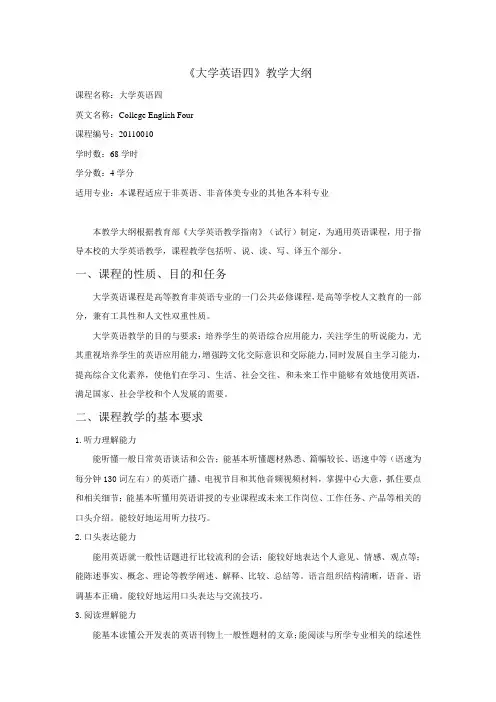
《大学英语四》教学大纲课程名称:大学英语四英文名称:College English Four课程编号:20110010学时数:68学时学分数:4学分适用专业:本课程适应于非英语、非音体美专业的其他各本科专业本教学大纲根据教育部《大学英语教学指南》(试行)制定,为通用英语课程,用于指导本校的大学英语教学,课程教学包括听、说、读、写、译五个部分。
一、课程的性质、目的和任务大学英语课程是高等教育非英语专业的一门公共必修课程,是高等学校人文教育的一部分,兼有工具性和人文性双重性质。
大学英语教学的目的与要求:培养学生的英语综合应用能力,关注学生的听说能力,尤其重视培养学生的英语应用能力,增强跨文化交际意识和交际能力,同时发展自主学习能力,提高综合文化素养,使他们在学习、生活、社会交往、和未来工作中能够有效地使用英语,满足国家、社会学校和个人发展的需要。
二、课程教学的基本要求1.听力理解能力能听懂一般日常英语谈话和公告;能基本听懂题材熟悉、篇幅较长、语速中等(语速为每分钟130词左右)的英语广播、电视节目和其他音频视频材料,掌握中心大意,抓住要点和相关细节;能基本听懂用英语讲授的专业课程或未来工作岗位、工作任务、产品等相关的口头介绍。
能较好地运用听力技巧。
2.口头表达能力能用英语就一般性话题进行比较流利的会话;能较好地表达个人意见、情感、观点等;能陈述事实、概念、理论等教学阐述、解释、比较、总结等。
语言组织结构清晰,语音、语调基本正确。
能较好地运用口头表达与交流技巧。
3.阅读理解能力能基本读懂公开发表的英语刊物上一般性题材的文章;能阅读与所学专业相关的综述性文献,或与未来工作相关的说明书、操作手册等材料,理解中心大意、关键信息、文章的篇章结构和隐含意义等;能较好地运用快速阅读技巧阅读篇幅较长、难度中等的材料;能较好地运用常用的阅读策略。
4.书面表达能力能用英语就一般性的主题观点表达个人观点;能撰写所学专业的英文摘要和英语小论文;能描述各种图表;能用英语对未来所从事工作或岗位职能、业务、产品等进行简要的书面介绍;语言表达内容完整,观点明确,条理清楚,语句通顺;能较好地运用书面表达与交流技巧。

《大学英语四》教学大纲课程名称:大学英语四英文名称:College English Four课程编号:20110010学时数:68学时学分数:4学分适用专业:本课程适应于非英语、非音体美专业的其他各本科专业本教学大纲根据教育部《大学英语教学指南》(试行)制定,为通用英语课程,用于指导本校的大学英语教学,课程教学包括听、说、读、写、译五个部分。
一、课程的性质、目的和任务大学英语课程是高等教育非英语专业的一门公共必修课程,是高等学校人文教育的一部分,兼有工具性和人文性双重性质。
大学英语教学的目的与要求:培养学生的英语综合应用能力,关注学生的听说能力,尤其重视培养学生的英语应用能力,增强跨文化交际意识和交际能力,同时发展自主学习能力,提高综合文化素养,使他们在学习、生活、社会交往、和未来工作中能够有效地使用英语,满足国家、社会学校和个人发展的需要。
二、课程教学的基本要求1.听力理解能力能听懂一般日常英语谈话和公告;能基本听懂题材熟悉、篇幅较长、语速中等(语速为每分钟130词左右)的英语广播、电视节目和其他音频视频材料,掌握中心大意,抓住要点和相关细节;能基本听懂用英语讲授的专业课程或未来工作岗位、工作任务、产品等相关的口头介绍。
能较好地运用听力技巧。
2.口头表达能力能用英语就一般性话题进行比较流利的会话;能较好地表达个人意见、情感、观点等;能陈述事实、概念、理论等教学阐述、解释、比较、总结等。
语言组织结构清晰,语音、语调基本正确。
能较好地运用口头表达与交流技巧。
3.阅读理解能力能基本读懂公开发表的英语刊物上一般性题材的文章;能阅读与所学专业相关的综述性文献,或与未来工作相关的说明书、操作手册等材料,理解中心大意、关键信息、文章的篇章结构和隐含意义等;能较好地运用快速阅读技巧阅读篇幅较长、难度中等的材料;能较好地运用常用的阅读策略。
4.书面表达能力能用英语就一般性的主题观点表达个人观点;能撰写所学专业的英文摘要和英语小论文;能描述各种图表;能用英语对未来所从事工作或岗位职能、业务、产品等进行简要的书面介绍;语言表达内容完整,观点明确,条理清楚,语句通顺;能较好地运用书面表达与交流技巧。
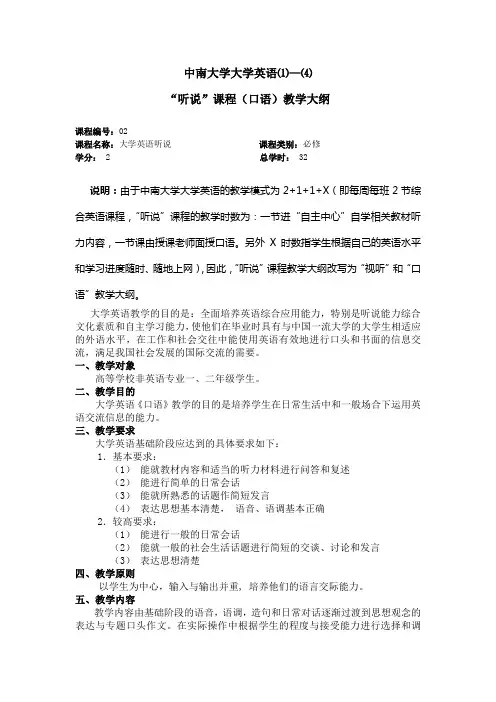
中南大学大学英语⑴—⑷“听说”课程(口语)教学大纲课程编号:02课程名称:大学英语听说课程类别:必修学分:2 总学时: 32说明:由于中南大学大学英语的教学模式为2+1+1+X(即每周每班2节综合英语课程,“听说”课程的教学时数为:一节进“自主中心”自学相关教材听力内容,一节课由授课老师面授口语。
另外X时数指学生根据自己的英语水平和学习进度随时、随地上网),因此,“听说”课程教学大纲改写为“视听”和“口语”教学大纲。
大学英语教学的目的是:全面培养英语综合应用能力,特别是听说能力综合文化素质和自主学习能力,使他们在毕业时具有与中国一流大学的大学生相适应的外语水平,在工作和社会交往中能使用英语有效地进行口头和书面的信息交流,满足我国社会发展的国际交流的需要。
一、教学对象高等学校非英语专业一、二年级学生。
二、教学目的大学英语《口语》教学的目的是培养学生在日常生活中和一般场合下运用英语交流信息的能力。
三、教学要求大学英语基础阶段应达到的具体要求如下:1.基本要求:(1)能就教材内容和适当的听力材料进行问答和复述(2)能进行简单的日常会话(3)能就所熟悉的话题作简短发言(4)表达思想基本清楚,语音、语调基本正确2.较高要求:(1)能进行一般的日常会话(2)能就一般的社会生活话题进行简短的交谈、讨论和发言(3)表达思想清楚四、教学原则以学生为中心,输入与输出并重, 培养他们的语言交际能力。
五、教学内容教学内容由基础阶段的语音,语调,造句和日常对话逐渐过渡到思想观念的表达与专题口头作文。
在实际操作中根据学生的程度与接受能力进行选择和调整。
其具体教学内容如下:1.语音和语调(1)音素(2)重音(3)连读(4)升调与降调(5)意群2.通过日常用语与对话进行语言功能意念训练1)一般表示法(1)问候、介绍(2)邀请、提议(3)祝贺、称赞(4)道歉、遗憾(5)意愿、决定(6)同意、不同意(7)喜恶、抱怨(8)判断、观点(9)建议、劝说(10)可能、不可能(11)相信、怀疑(12)高兴、恼怒(13)担忧、焦虑(14)满意、失望(15)兴趣、强调(16)解释、定义(17)争辩、澄清2)情景表示法(1)学校(2)节日(3)交通(4)广告(5)成功(6)旅行(7)运动(8)医院(9)娱乐(10)电脑(11)手机(12)网络(13)自然资源等等3.思想观念的表达与口头作文(1)与《综合课程》课文相关的主题讨论(2)故事的复述与评论(3)新闻与社会话题评述(4)以大学生活为主题的口头作文4.“精彩影视片断”的评述和讨论六、教学安排大学英语基础阶段的口语开设四个学期。
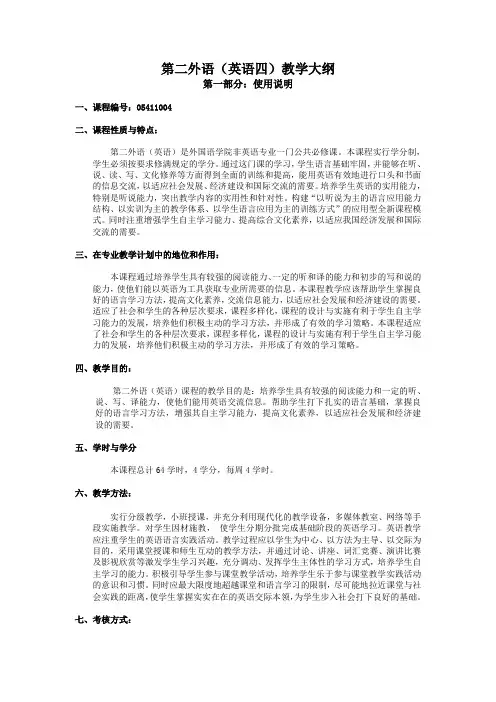
第二外语(英语四)教学大纲第一部分:使用说明一、课程编号:05411004二、课程性质与特点:第二外语(英语)是外国语学院非英语专业一门公共必修课。
本课程实行学分制,学生必须按要求修满规定的学分。
通过这门课的学习,学生语言基础牢固,并能够在听、说、读、写、文化修养等方面得到全面的训练和提高,能用英语有效地进行口头和书面的信息交流,以适应社会发展、经济建设和国际交流的需要。
培养学生英语的实用能力,特别是听说能力,突出教学内容的实用性和针对性。
构建“以听说为主的语言应用能力结构、以实训为主的教学体系、以学生语言应用为主的训练方式”的应用型全新课程模式。
同时注重增强学生自主学习能力、提高综合文化素养,以适应我国经济发展和国际交流的需要。
三、在专业教学计划中的地位和作用:本课程通过培养学生具有较强的阅读能力、一定的听和译的能力和初步的写和说的能力,使他们能以英语为工具获取专业所需要的信息。
本课程教学应该帮助学生掌握良好的语言学习方法,提高文化素养,交流信息能力,以适应社会发展和经济建设的需要。
适应了社会和学生的各种层次要求,课程多样化,课程的设计与实施有利于学生自主学习能力的发展,培养他们积极主动的学习方法,并形成了有效的学习策略。
本课程适应了社会和学生的各种层次要求,课程多样化,课程的设计与实施有利于学生自主学习能力的发展,培养他们积极主动的学习方法,并形成了有效的学习策略。
四、教学目的:第二外语(英语)课程的教学目的是:培养学生具有较强的阅读能力和一定的听、说、写、译能力,使他们能用英语交流信息。
帮助学生打下扎实的语言基础,掌握良好的语言学习方法,增强其自主学习能力,提高文化素养,以适应社会发展和经济建设的需要。
五、学时与学分本课程总计64学时,4学分,每周4学时。
六、教学方法:实行分级教学,小班授课,并充分利用现代化的教学设备,多媒体教室、网络等手段实施教学。
对学生因材施教,使学生分期分批完成基础阶段的英语学习。
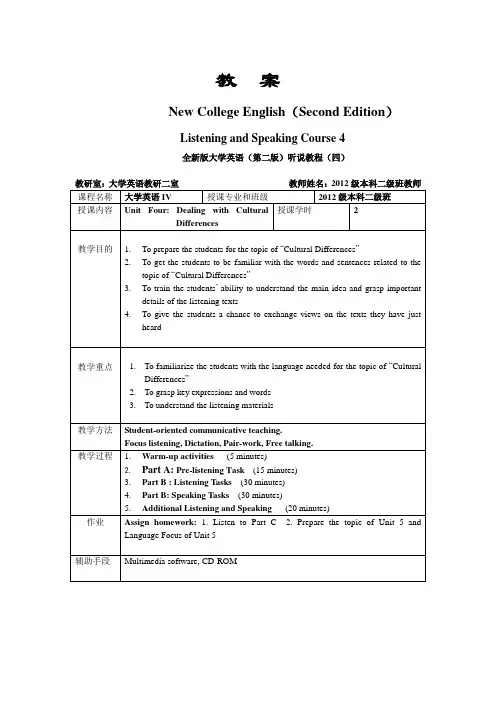
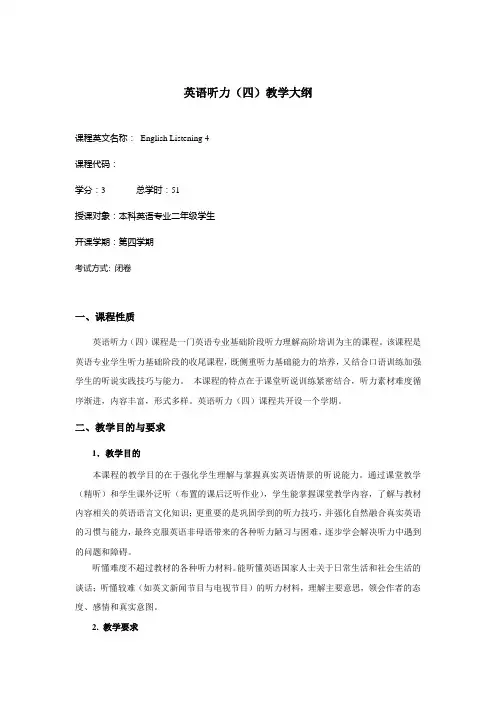
英语听力(四)教学大纲课程英文名称:English Listening 4课程代码:学分:3 总学时:51授课对象:本科英语专业二年级学生开课学期:第四学期考试方式: 闭卷一、课程性质英语听力(四)课程是一门英语专业基础阶段听力理解高阶培训为主的课程。
该课程是英语专业学生听力基础阶段的收尾课程,既侧重听力基础能力的培养,又结合口语训练加强学生的听说实践技巧与能力。
本课程的特点在于课堂听说训练紧密结合,听力素材难度循序渐进,内容丰富,形式多样。
英语听力(四)课程共开设一个学期。
二、教学目的与要求1.教学目的本课程的教学目的在于强化学生理解与掌握真实英语情景的听说能力。
通过课堂教学(精听)和学生课外泛听(布置的课后泛听作业),学生能掌握课堂教学内容,了解与教材内容相关的英语语言文化知识;更重要的是巩固学到的听力技巧,并强化自然融合真实英语的习惯与能力,最终克服英语非母语带来的各种听力陋习与困难,逐步学会解决听力中遇到的问题和障碍。
听懂难度不超过教材的各种听力材料。
能听懂英语国家人士关于日常生活和社会生活的谈话;听懂较难(如英文新闻节目与电视节目)的听力材料,理解主要意思,领会作者的态度、感情和真实意图。
2. 教学要求本课程的重点在于英语听力的技巧巩固与强化训练。
要求学生课前要预习新课的单词,尤其是熟练地掌握单词的正确读音;要求学生正确使用教材录音文字材料,避免过早参阅录音文字材料,从而对听力学习造成负面影响;教材内容为精听,教学不能满足于教材中练习的答案是否正确,学生应对教材听力内容有清晰的了解。
如果对已上过的教材内容仍有困难和问题,要及时课后补听,必要时由教师答疑;课外的泛听对提高听力十分重要。
泛听的量至少要有精听的3到5倍。
学生要完成教师布置和推荐的课外泛听作业,自觉地扩大泛听的题材和数量。
三、教学内容和学时安排(总学时48)本课程教学时间为十七周,每周三课时,共48课时。
每两周完成大约一个单元的教学内容,包括课文听说练习、情景文化理解和技巧训练等。
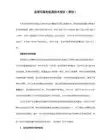
《大学英语IV》教学大纲College English IV (大学英语辅导课程)课程代码1J10095学分:4总学时数:80理论时数:80实践时数:开课对象:09级非英语专业学生一、课程性质、目的与任务与能力目标1.课程性质:《大学英语IV》(大学英语辅导课程)是非英语专业一年级学生必修的一门重要基础课程。
这门课程是以外语教学理论为指导,英语语言知识与学习策略和跨文化交际为主要教学内容,注重培养学生较强的大学英语四、六级应试能力和自主学习能力,集多种教学模式和教学手段为一体的教学体系。
2.课程目的:开设《大学英语IV》(大学英语辅导课程),旨在帮助学生具备基本的英语语言和语法知识,在读、听、写、说、译等方面受到初步的训练。
通过学习,帮助学生熟练掌握基本的词汇、基本语法及基本句子结构,综合运用基本知识进行听、说、读、写、译五项语言活动,以提高大学生的英语综合应用能力。
同时,开设《大学英语IV》(大学英语辅导课程)也是为了继续深化教学改革,以适应新的形势,使大学英语四、六级考试能更好地为贯彻《大学英语课程教学要求》服务,使大学英语四、六级考试能更好地为教学服务,实现以考促学。
3.课程任务:1.词汇本课程要求学生掌握的词汇量应达到4500个单词和700个词组(含中学应掌握的词汇),其中2000个单词为积极词汇,即要求学生能够在认知的基础上学会熟练运用,包括口头和书面表达两个方面。
2.语法巩固和加深以前学过的语法知识,提高在语篇水平上运用语法知识的能力。
3.阅读理解能力能在阅读中使用有效的阅读方法和阅读策略基本读懂一般性题材的英文文章,特别是四、六级考试中常出现的论说文和说明文等体裁的文章,阅读速度能达到每分钟70词。
在快速阅读篇幅较长、难度略低的材料时,阅读速度能达到每分钟100词。
能基本读懂国内英文报刊,掌握中心意思,理解主要事实和有关细节。
能读懂工作,生活中常见的应用文体的材料。
4.听的能力能较为熟练的应用各种英语听力技巧和听力应试策略,熟悉长、短对话、短文、Compound Dictation四大听力题型并能有效解题。
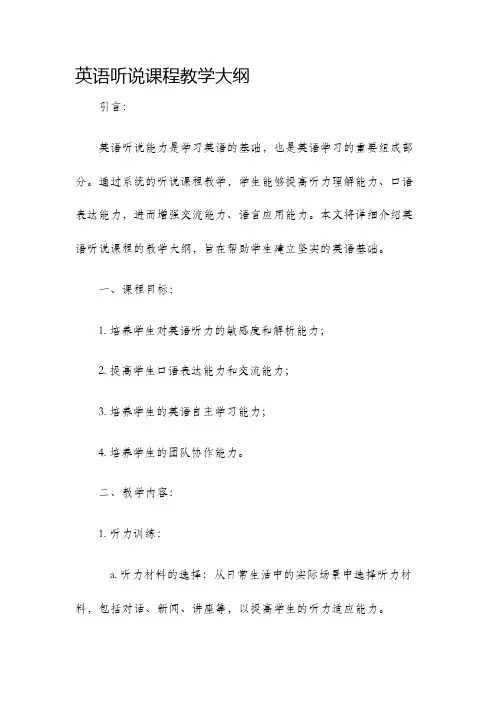
英语听说课程教学大纲引言:英语听说能力是学习英语的基础,也是英语学习的重要组成部分。
通过系统的听说课程教学,学生能够提高听力理解能力、口语表达能力,进而增强交流能力、语言应用能力。
本文将详细介绍英语听说课程的教学大纲,旨在帮助学生建立坚实的英语基础。
一、课程目标:1. 培养学生对英语听力的敏感度和解析能力;2. 提高学生口语表达能力和交流能力;3. 培养学生的英语自主学习能力;4. 培养学生的团队协作能力。
二、教学内容:1. 听力训练:a. 听力材料的选择:从日常生活中的实际场景中选择听力材料,包括对话、新闻、讲座等,以提高学生的听力适应能力。
b. 听力技巧的培养:引导学生掌握听力技巧,如预测信息、辨别关键词、捕捉语气等,以提高听力理解能力。
c. 听力实践的机会:通过听力训练活动,如听写、听力理解问答等,锻炼学生的听力反应速度和听力理解能力。
2. 口语表达:a. 口语训练的主题选择:选取与学生日常生活相关的话题,如家庭、学校、兴趣爱好等,以提高学生的口语表达能力。
b. 口语训练的形式安排:采用教师引导和学生互动的方式,如角色扮演、小组讨论等,激发学生参与讨论和表达的积极性。
c. 口语素材的积累:鼓励学生阅读相关的口语素材,如英语口语对话、英语口语杂志等,提高学生的口语表达水平。
3. 语音发音:a. 语音教学的基本规则:通过教授正确的发音规则和技巧,帮助学生纠正发音错误,提高语音准确性。
b. 语音训练的重点:注重学生的音标学习和语音模仿,通过实践训练,加强学生的语音感知和模仿能力。
c. 语音评估的反馈机制:定期进行语音评估,给予学生及时的反馈和指导,帮助学生不断完善语音发音。
4. 学习资源和工具:a. 媒体资源的利用:引导学生利用多种媒体资源,如英语广播、英语电视节目等,拓宽听说的学习渠道。
b. 学习工具的推荐:介绍一些实用的学习工具,如在线语音评估平台、英语学习APP等,提供便捷的学习辅助。
三、课程评估:1. 听力测试:通过听力测试,检测学生的听力理解能力,包括听力题目,如听力填空、听力选择等。

河北外国语职业学院课程教学大纲课程名称:综合英语IV开课专业:东西语系小语种专业制订人:张铁英审核人:张铁英批准人:《综合英语IV》教学大纲课程英文名称:English for Careers开课学期:第 2011-2012-2 学期总学时:32教研室:基础英语教研室主任:王海波撰写人:张铁英职称:讲师撰写时间: 2012 年 3 月 10 日一、大纲说明本大纲根据河北外国语职业学院东西语系第一版专业培养方案制订。
二、课程简介综合英语IV是我院东西语系小语种专业2010级各专业的专业基础课和必修课。
所选教材为《新职业英语—英语视听说》。
英语多媒体视听教学,根据教育学、心理学等一些学习理论及人脑记忆规律的原理对影像、图形、图像、声音、动画及文字等各种媒体信息加以控制。
在英语教学过程中,教师、媒体、学生之间的交互活动一直存在,并且随着现代教育技术的不断发展,这种交互活动会得到进一步的巩固和加强、提高和完善。
三、教学对象2010级东西语系小语种专业四、教学目的与对学生能力培养的要求本课程是河北外国语职业学院2010级东西语系小语种专业的必修基础课程。
我院东西语系综合英语(《新职业英语-英语视听说》)课程将语言学习与职业技能培养有机融合,确保教学内容与教学过程真正体现职业性和应用性,提高学生的英语交际能力与综合职业素质,从而提升他们的就业能力。
英语视听说教学目的提高学生对语言真实度较高的各类视听材料的理解能力和口头表达能力。
通过“视”、“听”、“说”的结合,以直观画面和情节内容为基础开展有针对性的口语训练,运用复述、总结、对话、口头概述、即席演讲等活动形式,提高学生的听力理解和口头表达能力。
五、主要先修课程和后续课程1、先修课程:综合英语I、综合英语II《新职业英语I》,综合英语III《新职业英语II》。
2、后续课程:综合英语IV《新职业英语—英语视听说》。
六、教学方式教师在多媒体教室授课,利用视频、音频、图片等现代化的辅助教学手段和网络源,分别采用“交流、交互、交际”三种教学方法。
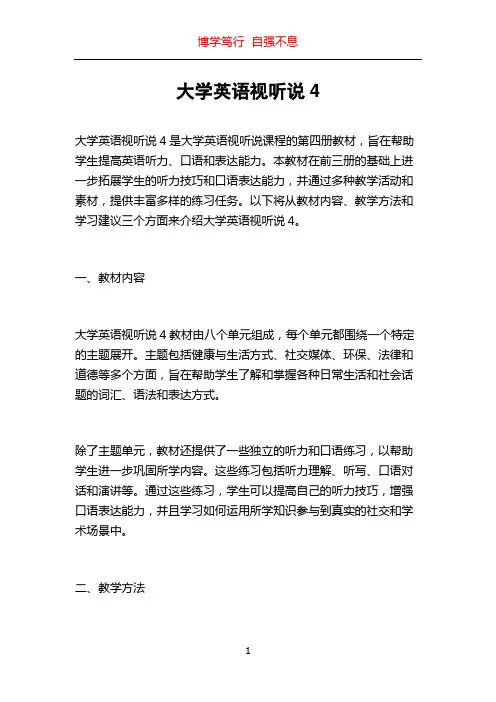
大学英语视听说4大学英语视听说4是大学英语视听说课程的第四册教材,旨在帮助学生提高英语听力、口语和表达能力。
本教材在前三册的基础上进一步拓展学生的听力技巧和口语表达能力,并通过多种教学活动和素材,提供丰富多样的练习任务。
以下将从教材内容、教学方法和学习建议三个方面来介绍大学英语视听说4。
一、教材内容大学英语视听说4教材由八个单元组成,每个单元都围绕一个特定的主题展开。
主题包括健康与生活方式、社交媒体、环保、法律和道德等多个方面,旨在帮助学生了解和掌握各种日常生活和社会话题的词汇、语法和表达方式。
除了主题单元,教材还提供了一些独立的听力和口语练习,以帮助学生进一步巩固所学内容。
这些练习包括听力理解、听写、口语对话和演讲等。
通过这些练习,学生可以提高自己的听力技巧,增强口语表达能力,并且学习如何运用所学知识参与到真实的社交和学术场景中。
二、教学方法在教学方法方面,大学英语视听说4采用了多种方法和技巧来帮助学生有效地学习。
首先,教材中的听力材料包括多种语速和语调的录音,以帮助学生适应不同场景中的英语听力环境。
同时,教材还提供了丰富的听力理解练习,通过听力材料的反复练习,学生可以提高自己的听力水平。
其次,大学英语视听说4注重口语交际能力的培养。
教材中的口语对话和演讲练习旨在让学生尽可能地进行口语实践。
通过模仿和参与实际对话,学生可以提高自己的口语表达能力,并学会运用所学知识和技巧进行有效的口头表达。
再次,大学英语视听说4注重学生的自主学习能力的培养。
教材中提供了大量的自主学习任务,包括听力、口语和写作练习。
学生可以通过这些任务进行自主学习,提高学习效果,并培养自主学习的能力。
三、学习建议对于学生而言,要学好大学英语视听说4,需要采取一些有效的学习策略和方法。
首先,建议学生在课前预习教材,了解该单元的主题和内容。
预习使学生对教材内容有一个初步的了解,有助于在课堂上更好地理解和掌握。
其次,学生应充分利用教材中的多样化的练习任务。
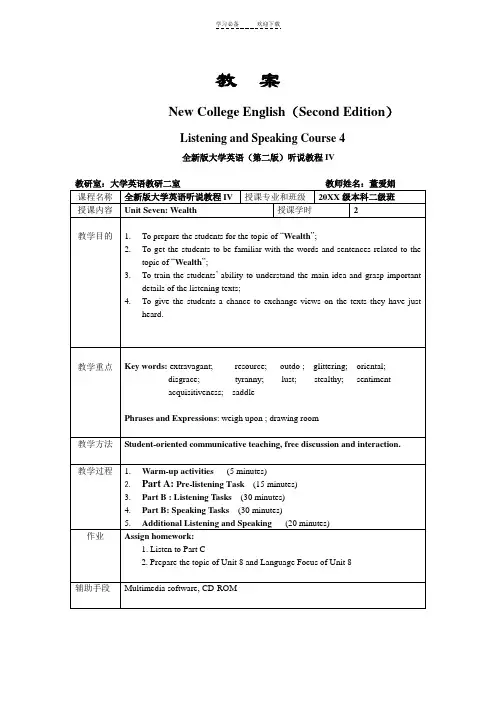
教学对象:大学非英语专业学生教学目标:1. 培养学生良好的英语听说习惯,提高学生的英语口语表达能力。
2. 增强学生对英语国家文化背景知识的了解,提高跨文化交流能力。
3. 培养学生的逻辑思维能力和批判性思维能力。
教学内容:《大学体验英语听说教程4》共包含12个单元,每个单元包含听力材料、口语练习和拓展活动。
本教案以第6单元为例,具体教学内容如下:一、单元主题:Environmental Protection(环境保护)二、教学重点:1. 听力理解:理解英语国家人士在环境保护方面的观点和态度。
2. 口语表达:学会用英语表达对环境保护的看法和建议。
3. 拓展活动:了解我国环境保护的现状和挑战。
三、教学步骤:1. 导入(5分钟)- 教师简要介绍单元主题,激发学生的学习兴趣。
- 通过图片、视频等形式,展示英语国家在环境保护方面的成果和挑战。
2. 听力训练(20分钟)- 学生自主完成听力材料,教师指导学生注意关键词、短语和句子结构。
- 教师播放听力材料,学生跟读并回答问题。
3. 口语练习(20分钟)- 教师带领学生进行口语练习,包括角色扮演、小组讨论等。
- 鼓励学生用所学词汇和句型表达对环境保护的看法和建议。
4. 拓展活动(15分钟)- 学生查阅资料,了解我国环境保护的现状和挑战。
- 分组讨论,提出应对措施和建议。
5. 总结与反馈(10分钟)- 教师总结本节课的重点内容,强调环境保护的重要性。
- 学生分享自己的学习心得,教师给予点评和指导。
四、教学评价:1. 听力测试:考察学生对听力材料的理解程度。
2. 口语展示:评估学生的口语表达能力和交际能力。
3. 拓展活动成果:检查学生对环境保护现状的了解程度。
五、教学资源:1. 教材:《大学体验英语听说教程4》2. 课件:多媒体教学课件,包括图片、视频等素材3. 网络资源:环境保护相关网站、论坛等六、教学反思:1. 教师应关注学生的个体差异,因材施教,提高学生的学习兴趣。
Advanced Media English Listening and SpeakingUnit 1 School lifeBy Xiaoyang QiThere are six clips in this Unit, all about School life.Time Allotment:2 periods=2 classes per week, each unit will spent 2 weeks.Learning objectivesOn completion of this unit, students should be able to :●Approve the listening ability;●Learn to find out the key points during listening clips, such as the figures.●Learn the discussion ability which relates the topics;●Improve the team work ability;●Understand and talk about school life.Teaching Content:●Listen the healthy eating in school, and discuss about issues which relatesto the meal, environment and service of school cafeteria.●Listen to the grants for school buildings, and let students do the discussionof where can get grants for its campus refurbishment.●Listen to the clip three of the increasing tuition fee. Let students discussthe issue of the increasing higher education tuition fee.●Listen to the clip four of the Graduates facing difficult time. Let studentsdiscuss the job market in China nowadays.●Listen to the clip five of Value of a degree, and discuss the the benefits thata good educational background can bring to people.●Listen to the clip six of school disciplines, and discuss the importance ofschool disciplines and how to strengthen school disciplines.Teaching ProcedureClip 1:1. Lead-inTeaching tipsa. Ask students to work in pairs or in groups, discuss these questions andthen share their answers with the whole class.b. It is nor necessary for every student to discuss all the questions, so theteacher may assign one or two questions to each pair or group.c. The teacher may walk around the classroom and provide assistance whenneeded.Questionsa. Do you often eat at the school cafeteria?b. How do you think of the food there?2. Listening skillsWord Tipsa. an array of 一组,一群Script of Healthy Eating in SchoolWomen 1: The schools are doing it because they’ve got to promote healthy eating and I think it’s the right message. But I think really they should target the parents beforehand, because I think it’s quite sad for the children to have things in there and then to take them away.Women 2: I think it is a good idea. I think children should eat healthy while they’re at school. Treats should be weekends or after school.Man 1: So what is allowed in children’s lunch bag? Well, I have an array of food. Good and bad.Man 2: Sandwiches, pasta, fruit and nuts are fine. Sweets, crisps, fizzy drinks and chocolate though are set to be taken away.Clip 2:1. Lead-inTeaching tipsa. Ask students to work in pairs or in groups, discuss these questions andthen share their answers with the whole class.b. It is nor necessary for every student to discuss all the questions, so theteacher may assign one or two questions to each pair or group.c. The teacher may walk around the classroom and provide assistance whenneeded.Questionsa. Where do you think schools can get grants for its campus refurbishment?2. Listening skillsWord TipsRefurbishment n. 整修Commit v. 调配...供使用,拨出Muffle v. 包裹,裹住Forensic adj. 法庭的,法医的Forensic science 法医学Script of Grants for School BuildingsVoice-over: The building work continues but for how much longer? They’re ready to start a second phase of refurbishment here, but the college may have to send the builders home.Women 1: We’ve just come up onto the roof of the old building and as you can see across there, that is the new building we’ve been working on for two years and we’re just about to move into the refurbishment of this great two-lifted building.Voice-over: The principal of South Thames College told me what wouldhappen is she doesn’t get the money for the new building project.Women 1: I will have already committed six and a half to eight million pounds that will then be the college’s debt. And this building would no longer work because the services would be cut off and this will have to be muffled.Voice-over: From hair dressing to forensic science-- over 20,000 students and adult learners come here. Some classes are in the old listed building. But the basement floods and the heating breaks down and that’s why they wanted to give it a refurb.Clip 3:1. Lead-inTeaching tipsa. Ask students to work in pairs or in groups, discuss these questions andthen share their answers with the whole class.b. It is nor necessary for every student to discuss all the questions, so theteacher may assign one or two questions to each pair or group.c. The teacher may walk around the classroom and provide assistance whenneeded.QuestionsThe tuition for higher education is increasing year by year at home and abroad. As a college student, how do you think of the issue? If you come from a poor family, how would you cover the increasing tuition? Give some examples to illustrate idea.2. Listening skillsWord TipsPut sb. off 使扫兴Breathtakingly adv. 让人吃惊地Chancellor n. <英> 大学名誉校长Recession n. (经济的)衰退;衰退期Ivory tower 象牙塔(指脱离实际生活的文学家或艺术家的小天地)Reckless adj. 不计后果的Controversial adj. 有争议的Script of the Increasing Tuition FeeVoice-over: University fees paid by these students are capped at around 3,000 pounds a year. But the government is due to review the situation and the body representing the bosses of England’s universities has a suggestion, to increasing fees to 5,000 or even 7,000 pounds a year.Woman 1: We have a world-class reputation that needs to be maintained. Students, I think quite rightly, expect a very high-quality higher education. And that has to be paid for.Woman 2: Today’s second-year students will leave university with debts of more than 17,000 pounds on average. Under one of the schemes being discussed today, that amount will increase to more than 26,000 pounds, a sum that could take quite a few years to pay off. The questions is, would this increase actually put young people off from applying to university in the first place.Man 1: Potentially yes. Yes, I would have to assess my personal situation at that time. But I think it will put a lot of people off as it’s huge amount of money. Woman 2: I’m doing a history degree so I only have about eight hours of contact a week. So as for my money being wasted, whereas medical students have lots of labs and lots of money spent on them, so I think it would kind of cause me to think twice about going to university and which university I go to and where.Man 2: Well I think it is breathtakingly arrogant of university vice chancellors to be talking about doubling the level of tuition fees and the level of graduate debt in the middle of a recession. I think they need to get out of their ivory tower tolook at what is going on with the economy now. Students are in increasing hardship already and leaving tens of thousands of people graduating with even bigger amounts of debts is reckless and irresponsible.Voice-over: Introducing tuition fees in the first place was controversial and difficult so the government is unlikely to rush to increase them now. Annabel Roberts. ITV News.Clip 4:1. Lead-inTeaching tipsa. Ask students to work in pairs or in groups, discuss these questions andthen share their answers with the whole class.b. It is nor necessary for every student to discuss all the questions, so theteacher may assign one or two questions to each pair or group.c. The teacher may walk around the classroom and provide assistance whenneeded.QuestionsLook at the picture. It shows the job market in China nowadays. Now, describe the picture from the following two aspects.a. What do you see in this picture?b. What does the picture show about job-hunting situation in Chinanowadays?2. Listening skillsWord TipsDownturn n. (经济)衰退Meltdown n. <美俚>灾难Crunch n. 艰难局面Savvy adj. 聪慧的Script of Graduates Facing Difficult TimeVoice-over: Students setting out on life’s journey are feeling the economic strain before they’re even secured their first job. For as the economy contracts, graduate vacancies have fallen for the first time in three years.Woman 1: Most of the other people that I know in my degree, in my course, they’re still struggling to find jobs.Voice-over: Diphian Serran is a final-year student hoping for a first-class degree and praying for a good job. So far, despite numerous interviews and an impressive CV, she’s had bad luck.Woman 1: Very bad luck. Unfortunately. I’ve gone through the interview stage of many, so to the final stage. But once I reached there, I often get, either get rejected or it’s, you know, “we’ll let you know”.Voice-over: The downturn in manufacturing and the meltdown in the financial services mean that nearly half of the employers expect to hire fewer graduates this year. That means the competition on campus had never been tougher. Woman 2: This is the generation of university students who were born and bred in the economic boom. But they are graduating in the economic bust. Recruitment’s down, salaries are frozen.This is crunch time in every sense. Man 1: These times are a lot rougher than they had been the last 10,15, possibly even 20 years. But employers are still recruiting. The brains of today are the profits of tomorrow. The question is whether the graduates are able to adjust their expectations to the realities of the labour market.Voice-over: For this final year engineering students’reality is still great. Vacancies in engineering and public sector are on the rise. Will’s found a job in a bank. His starting salary is 42K.Man 2: There are still opportunities down there for people being smart or, kind of risk savvy enough to get them so it’s just, you know, it’s more difficult but it’s not impossible.Voice-over: The generation who never had it so good as children may find theeconomic realities harder as adults. Penny Marshall. News at Ten. Warwick University.Clip 5:1. Lead-inTeaching tipsa. Ask students to work in pairs or in groups, discuss these questions andthen share their answers with the whole class.b. It is nor necessary for every student to discuss all the questions, so theteacher may assign one or two questions to each pair or group.c. The teacher may walk around the classroom and provide assistance whenneeded.QuestionsLook at the picture and discuss the following questions.a. What is the student holding?b. How does he feel?c. What do you think he is going to do?2. Listening skillsWord TipsBenchmark n. 水平点,基准Indulgence n. 纵容;迁就Deprive v. 剥夺Saddle v. 使负担;强加Justify v. 证明……是正当的Flaw n. 缺点Reckon v. 认为Script of Value of degreeVoice-over: It is the season when 400,000 bright young things write off, hopingtheir dreams will come true. Not a letter to Santa, but a university application form. The government wants half of all our young people to experience the wonderful world of the undergraduate. The joy of learning, of student life, the thrill of graduation.The invitation to high-powered, exciting careers.The reality can be rather different. A few years ago these telesales staff would have been school leavers. Today this publishing firm employs only graduates. Same job, similar salary, different qualifications.Man 1: Fifteen years ago we would’ve probably said the basic requirements would be A-levels. Because that would be the benchmark we would’ve expected our new employees to have achieved. You know now we see the benchmark is being the degree. So I think the very fact that there are far more students leaving university looking for jobs, enables us to specify a degree toda y whereas we wouldn’t have done 15 years ago.Voice-over: Thirty-five per cent of graduates enter the world of work in a job that doesn’t need a degree. And many get stuck in careers they don’t like. Asked what they did want to do, 47% hoped for jobs in media, advertising or PR. Other popular careers include design—favored by 21% of women—and computing, picked by 23% of men. But over 10% of media studies graduates are currently unemployed. It’s the same for design studies. And even worse in computing. Unpopular careers include engineering. Only 9% of students mention that. And yet unemployment amongst civil engineering graduates is only 2.9%.At today’s graduate recruitment fair, thousands of students were searching for jobs. But engineering stands were typically deserted. And those that did enquire often lacked relevant qualifications. The engineering industry believes in encouraging yet more school leavers to go to university may be an expensive indulgence.Man 2: Universities argue that we are not training, we are educating. We are creating people who can think. Now, if we are just producing philosophers and thinkers, I don’t think we are going to resolve the economic needs of thiscountry. I mean, that would be absolutely silly, quite frankly.Voice-over: There are now 60,000 different degree courses in Britain. The biggest increase in so-called cheap degrees, usually humanities or social sciences, which don’t require expensive equipment or laboratories. Universities get money for how many students they have and extra cash if they can woo school leavers from poor and deprived backgrounds. Students are saddled with debts, justified by government on the basis that across a lifetime, a degree is worth an extra 400,000 pounds. But is it?Man 3: There are two flaws in the government’s figures. Firstly they’re based on the percentage of graduates going through our education. Those figures were in a small per cent. In a couple of years’ time one in every two people will go through higher education of that age group. The second big fundamental problem is they were based on an employment market where there was a job for life, Things have changed.Voice-over: Here at this plumbing school in North London, about 20% of the class are graduates who’ve decided to retrain. Many come from just the kind of backgrounds government wants to encourage into higher education. But their experience is hardly an advert.Man 4: By the time I graduated I would say there weren’t the jobs there. So in hindsight, it probably was a waste of time, yeah.Man 5: So how much money do you reckon you can earn as a plumber? Woman1: Well, they say between 50 to 75 thousand in about 10 years’ time. Man 5: Seventy-five grand?Woman 1: Approximately, yes.Script of School DisciplinesSo going back to my question, how do we translate our values into action? To reprise[3] those values, families as the origin of society, the role of schools in backing up and adding to the lessons of home, the need for clear boundariesand for rules of behavior, the diversity and the differentness of children, the obligation to help the most vulnerable and disadvantaged.Earlier this month I spoke about families. Most of all, we need to encourage stable parental relationships for example, as has been suggested, through removing the bias through against cohabitation in the benefits system and using the tax system to support married couples.Yesterday I spoke about special educational needs. We need to radically reform the statementing process to give parents what they need, including a more sensitive and flexible system of categorising special needs. Parents need greater choice between specialist schools and mainstream schools. And until the system is properly balanced, we believe we need a moratorium[4] on the closure of special schools.Today I want to explain something of what we'll do to improve behaviour in the mainstream schools.Sometimes people who discuss education give the impression that some sort of incredibly complex alchemy.It isn’t. We know what works because we see it, in our own country and oversees. The best schools, whether they are private schools, academies, grammar schools, comprehensives,have some simple things in common. Most of all, they have an independent ethos and clear rules on acceptable behaviour.Schools should be places where teachers teach and children learn - not sort of holding centres for children irrespective of how badly they behave. Most of all, they should be places where the kids respect, and even fear, the teachers, and not the other way around. If we want our children to grow up in a loving environment, they need to know where the lines are and not to step over them.Heads need to be able to impose real codes of behaviour and discipline and be backed up by parents.Teachers often say to me that they set clear rules, they enforce them and then the parents come along and take the side of the child. This can completely undermine the authority of the school and contribute directly to bad behaviour.Now many schools have home-school contracts, setting out in black and white what is expected of the school, of the parent and of the child. I'd like to take this idea further and make them enforceable, as requirements of admission and as grounds for exclusion.Head teachers should be able to say to parents, if you don’t sign up to this code of conduct for yourselves and your children, your child cannot come to school as simple as that.And I want to strengthen the position of teachers as well. More needs be done to protect teachers from the tiny minority who are bent on undermining authority in schools by making false allegations of abuse against the teacher. This is a growing problem. A recent survey in SecEd magazine indicated that 20 per cent of teachers had been falsely accused and 55 per cent of teachers knew a colleague in their school to whom this had happened.The Teacher Support phone line is taking almost twice as many calls about pupil allegations as it did a year ago. Yet in the past ten years only three per ce nt of serious allegations have actually resulted in a conviction. And that’s why we believe that teachers should have the full protection of anonymity until the case against them has actually been dealt with.Given the elementary principle that a head teacher must have control over the standards of behaviour in his or her school, this must mean, as a last resort, the power to exclude pupils whose conduct badly disrupts the education of others.Today, at the moment, if a head teacher excludes a pupil, the child has a right of appeal to an external panel run by the local authority. And currently a quarter of the exclusions which are reviewed by appeals panels are overturned. More than half of these pupils are then returned to the school from which they have been expelled.Now just imagine what that does to the standing of the head teacher in the eyes of the students. To see a child, expelled for bad behaviour, swaggering back into the school. It sends completely the wrong message about the relative power of the child and of the school itself. The local authority should be there to serve the school, to help the school, to support the school, not the other way around.。
大学英语听力4教学设计1. 教学目标本课程旨在提高学生的英语听力能力,包括听力理解水平、提高听力技巧、培养听力的兴趣和习惯等,为学生日后学习和实践英语语言打下基础。
2. 教学内容教学内容主要分为以下几个方面:•英语语音和语调的学习•基本语法知识的巩固和拓展•听力技巧的培养•针对不同场景的听力练习和实践3. 教学方法本课程采用多种教学方法,包括但不限于:•授课式讲解•互动交流式授课•听力训练和实践•个性化学习支持4. 教学过程第一讲:英语语音和语调的学习•任务描述:介绍英语语音学的基本概念和元音和辅音的发音特点,以及英语语调的基本规律和用法•教学方法:采用讲解和演示的方式,结合实例进行讲解•课堂作业:利用音频资料进行练习,完成英语音标以及语调的书写和模仿练习第二讲:基本语法知识的巩固和拓展•任务描述:对英语语法知识进行回顾和梳理,特别是以听力为主的语法知识,如动词时态、名词和代词的用法等•教学方法:告知和演示的方式,针对难点进行解释和实例展示•课堂作业:结合听力训练,利用文章和对话等材料进行语法练习第三讲:听力技巧的培养•任务描述:介绍不同的听力技巧,如预测答案、注意上下文、结合音频试图拼凑句意等方法,以提高听力理解能力•教学方法:采用演示和模拟的方式,提高学生的听力技巧•课堂作业:利用音频资料进行听力练习,按照不同的技巧进行分类和分析第四讲:针对不同场景的听力练习和实践•任务描述:针对不同的场景和主题,如社交、商务、旅游等,进行不同形式的听力练习和实践,以提高学生的听力应对能力和实践能力•教学方法:采用实地实践和模拟的方式,让学生在真实的场景中练习听力和交流•课堂作业:分别针对不同场景进行录音和模拟练习,分析和总结学习成果5. 教学评估本课程的教学评估主要分为以下两个方面:•学生的听力水平和听力技巧的提高•学生的英语语言应对能力和实践能力的提高6. 结束语通过本教学设计的实施,我们将对学生的英语听力水平和实践能力进行全面提升,让学生在日后的学习和实践中能更加自信和游刃有余。
1
《英语听说4》课程教学大纲
课程英文名称:English Listening and Speaking 4
课程号:1229
制定单位:外语部
制定人或执笔人:
审核人:
制定(修订)时间:
2
《英语听说4》课程教学大纲
适用专业:所有专业
适用层次:本科
总学时(学分): 36学时(2学分)
先修课程:英语听说3
一、课程性质和教学目的
《英语听说1》课程是为我院所有专业开设的公共基础必修课,开设时间为第二学年的
第二学期。本课程通过多媒体设备对学生进行基本语言听力与口语训练,使学生逐步提英语
听力理解能力和口头表达能力,掌握各种语境恰当的英语表达方式,扩大词汇量和熟悉英语
常用句型。本课程着重培养学生的英语听力和口语能力,同时提高他们的英语综合应用能力,
使他们在今后工作和社会交往中能用英语有效地进行口头和书面的信息交流,同时增强其自
主学习能力,提高综合文化素养,以适应我国社会发展和国际交流的需要。
二、教学内容
Unit 1 Enjoy your feeling!
(一)教学目标
1. Learn how to describe anger, sadness and happiness
2. Master how to make and accept suggestions
3. Grasp how to promise and refuse to help
(二)教学重点和难点
1. Making and accepting suggestions
2. Promising and refusing to help
(三)教学内容
I. Lead-in
II. Listening Skills
III. Listening In
IV. Speaking Out
Unit 2 Beauty can be bought.
(一)教学目标
1. Learn how to describe plastic surgery
2. Master how to express surprise, annoyance and determination
3. Grasp how to decline and accept an invitation
(二)教学重点和难点
1. Expressing surprise, annoyance and determination
2. Declining and accepting an invitation
(三)教学内容
I. Lead-in
II. Listening Skills
III. Listening In
IV. Speaking Out
3
Unit 3 Watch out when nature strikes back.
(一)教学目标
1. Learn how to describe natural disasters and fear
2. Master how to invert for emphasis
3. Grasp how to speak with uncertainty
(二)教学重点和难点
1. Inverting for emphasis
2. Speaking with uncertainty
(三)教学内容
I. Lead-in
II. Listening Skills
III. Listening In
IV. Speaking Out
Unit 5 Distant pastures are always greener.
(一)教学目标
1. Learn how to dismiss an employee and describe job-hopping
2. Master how to ask for and give reasons
3. Grasp how to express regret
(二)教学重点和难点
1. Asking for and give reasons
2. Expressing regret
(三)教学内容
I. Lead-in
II. Listening Skills
III. Listening In
IV. Speaking Out
Unit 6 The truth can be stranger than fiction.
(一)教学目标
1. Learn how to describe superstitions
2. Master how to argue for a possibility
3. Grasp how to add information
(二)教学重点和难点
1. Arguing for a possibility
2. Adding information
(三)教学内容
I. Lead-in
II. Listening Skills
III. Listening In
IV. Speaking Out
Unit 10 Culture makes me what I am.
(一)教学目标
1. Learn how to invite questions
4
2. Master how to ask for reasons
3. Grasp how to describe hard work
(二)教学重点和难点
1. Asking for reasons
2. Describing hard work
(三)教学内容
I. Lead-in
II. Listening Skills
III. Listening In
IV. Speaking Out
三、课时分配
章 节 内 容 学 时
Unit 1 Enjoy your feeling! I. Lead-in II. Listening Skills III. Listening In IV. Speaking Out 6
Unit 2 Beauty can be bought. I. Lead-in II. Listening Skills III. Listening In IV. Speaking Out 6
Unit 3 Watch out when nature strikes back. I. Lead-in II. Listening Skills III. Listening In IV. Speaking Out 5
Unit 5 Distant pastures are always greener. I. Lead-in II. Listening Skills III. Listening In IV. Speaking Out 5
Unit 6 The truth can be stranger than fiction. I. Lead-in II. Listening Skills III. Listening In IV. Speaking Out 5
Unit 10 Culture makes me what I am. I. Lead-in II. Listening Skills 5
5
四、课程教学的基本要求
1. 听力理解能力:能听懂英语授课,能听懂日常英语谈话和一般性题材的讲座,能
听懂语速较慢(每分钟150 -170词)的英语广播和电视节目,能掌握其中心大意,抓住要
点。能运用基本的听力技巧。
2. 口语表达能力:能在学习过程中用英语交流,并能就某一主题进行讨论,能就日
常话题用英语进行交谈,能经准备后就所熟悉的话题作简短发言,表达比较清楚,语音、语
调基本正确。能在交谈中使用基本的会话策略。
五、考核环节
1.命题
考试内容以《英语听说4》课程教学内容所涉及的听力及口语练习为主,覆盖面要
广,难易程度应适中,重点考核学生英语长短对话及语篇的听力理解能力和不同对话语境的
英语表达能力。
2.成绩的构成
学生成绩由两个部分组成,即期末卷面成绩和平时表现(包括:出勤情况、课堂表
现、完成作业情况)成绩。所占分值分别为:70分和30分。期末考试采取闭卷笔试的形式
和口试形式。
六、主要参考教材及教学参考书
《新视野大学英语4视听说教程 》,王大伟主编,外语教学与研究出版社。
《新视野大学英语4视听说教程教师用书》,王大伟主编,外语教学与研究出版社。
教育部办公厅关于印发《大学英语课程教学要求》的通知,教高厅[2007]3号。
III. Listening In
IV. Speaking Out
Oral English Test 4
合计
36